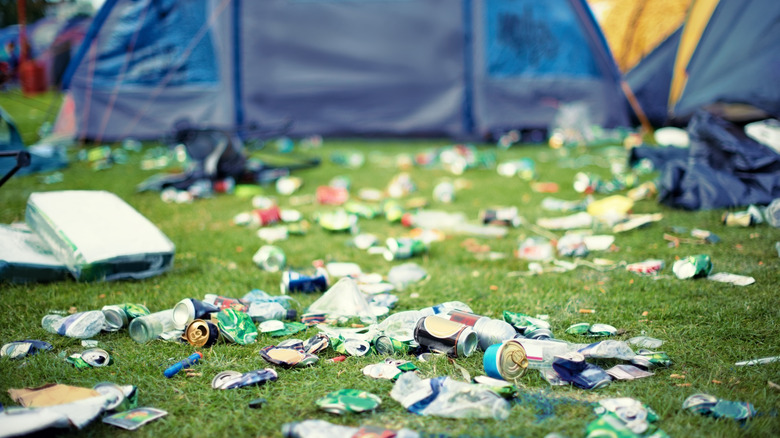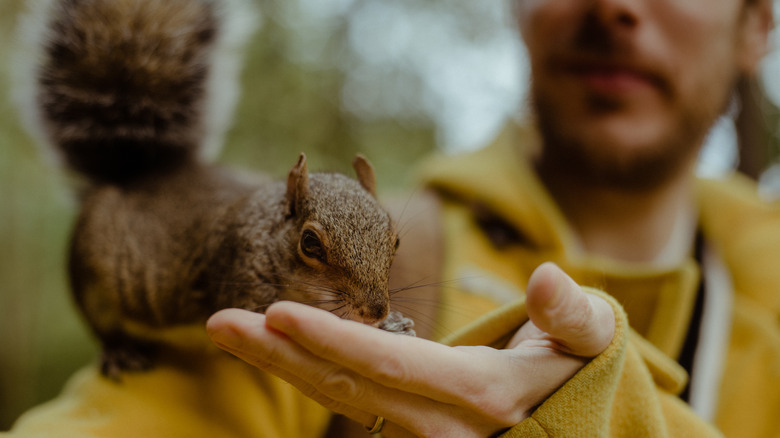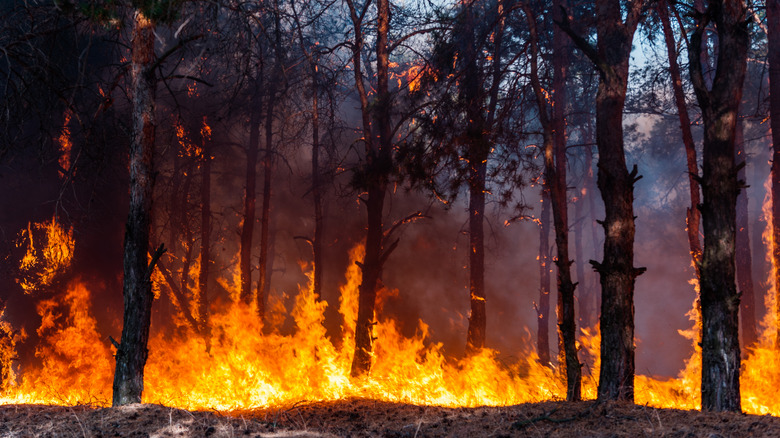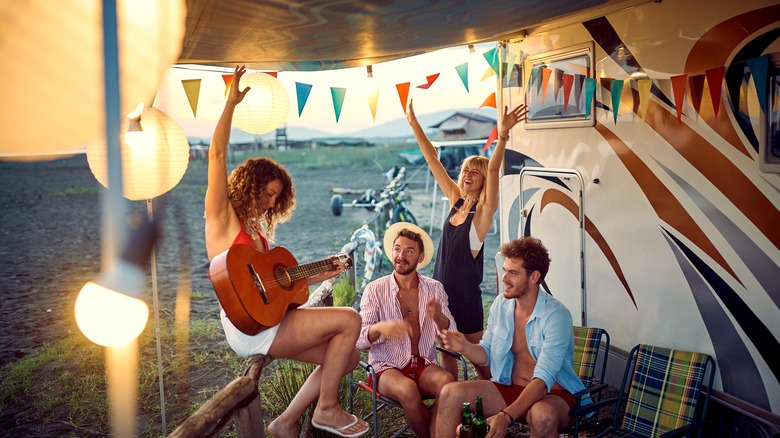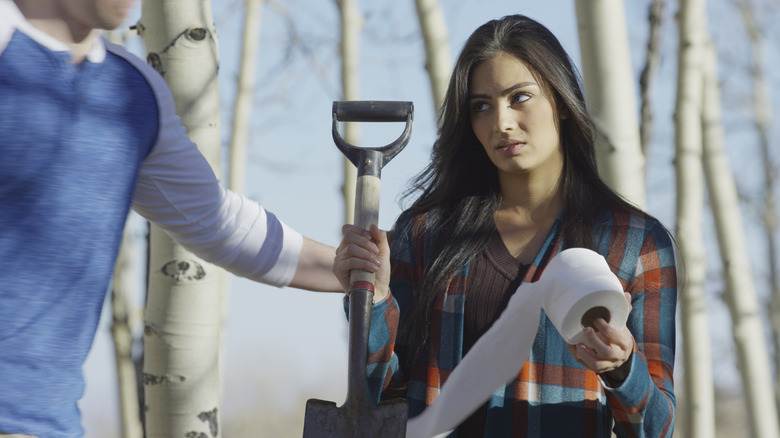Avoid These Dumb Camping Etiquette Blunders To Save Yourself From Embarrassment
Embarking on a camping trip is always an exciting experience. Nature is unpredictable, so no two camping trips are exactly alike. There are always new thrills to be had and new memories to be made. Camping is a popular pastime that is enjoyed by travelers all over the world. It's a wonderful way to fully immerse yourself in nature and explore the most beautiful places in America's state and national parks.
You don't have to be a rugged adventurer to plan an epic camping trip. If you keep things simple, it's a budget-friendly travel option that is accessible to most people. When you're doing research in preparation, you may come across intimidating articles full of expensive must-have gear, but the truth is that you only need a few essentials to go camping. Understanding the basics of camping etiquette can be far more intimidating than stressing about buying the best high-quality gear. There's no need to become an outdoor recreation pro overnight, but if you want to avoid embarrassing yourself, you should avoid these common camping blunders.
Don't leave your campsite a mess
Among outdoor enthusiasts, there's a popular saying — take only pictures, leave only footprints. The phrase is believed to be an adaptation of a quote from an iconic Indigenous leader Chief Seattle who said, "take only memories, leave only footprints" in the early 1850s. It was further popularized by the United States National Park Service and it has become a rallying cry for nature lovers in addition to "leave no trace" policies.
When you're camping, you should always try to minimize your impact on the natural environment. This means you should make sure that you've tidied up your campsite before you depart. Spend some time "sweeping" the site after you've packed up all of your gear. Make sure you pick up any sneaky garbage, like the twist ties that go on sandwich bags or small pieces of plastic from snack wrappers. Don't throw your garbage in the fire pit, even if it is paper or cardboard. Place all garbage in designated trash receptacles, especially if you're bear country. And never leave your mess for the campground host or the next camper to clean up. Aim to leave your site better than you found it.
Additionally, it's important that you don't take any firewood home with you or bring your own firewood to a campsite. If you do, you may get some dirty looks from other campers because moving firewood can transport invasive insects or bugs that may kill or harm trees. Always opt for local firewood that is purchased or gathered within 10 miles of your campsite. You should also avoid disturbing plants. It may seem tempting to pick a pretty flower, but other campers deserve to see their beauty, and pollinators rely on those flowers for survival.
Don't feed the wildlife when camping
Just as you shouldn't pick the flowers at your campsite, you should leave the animals alone. "While a squirrel might look cute munching on our trail mix — feeding wild animals hurts them," the National Park Service website states. "You may have the best intentions when you want to share your trail mix with a critter in a park but feeding wildlife is dangerous."
Over time, feeding animals can make them dependent on humans for food, which isn't healthy for them. Animals require certain nutrients that are prevalent in their natural diets. If they become reliant on people, they may stop hunting or foraging because they think it's easier to hang out near a campsite and score some scraps. "Depending on humans for food is called food conditioning. Food conditioning is dangerous for animals because it can lead to serious consequences like getting sick, starving, or even having to be killed if they become too aggressive," says the National Park Service.
With enough conditioning, animals will start to lose their fear of people, and that can be dangerous for everyone involved. You've probably heard stories about bears wandering into campgrounds and tearing through coolers and picnic baskets. In some parts of the country, any food that isn't properly stored can attract bears to your campsite. Even if an animal seems tame, they could become aggressive at any moment. A trip to the emergency room for a rabies shot is an embarrassing way to conclude a camping trip. Let wild animals remain wild.
Don't leave your campfire unattended
On July 9, 2016, three campers packed up their campsite in the forest outside of Nederland, Colorado. Nederland is a beautiful village nestled in the Rocky Mountains, about a half hour from one of America's best college towns – Boulder, Colorado. The campers had spent the night camping illegally on private property. When they decided it was time to go, they didn't bother ensuring that their campfire was fully extinguished. The weather was hot, the humidity was low, and the wild fire risk was high. By the time the campers reached town, plumes of dark smoke were rising from the mountains. Soon, the forest was ablaze. By the next evening, the wildfire had destroyed over 500 acres. The Cold Springs fire ultimately burned for seven days and eight homes were destroyed.
The Cold Springs fire wasn't the first wildfire that began from a campfire, and it probably won't be the last. Imagine being the camper responsible for so much destruction. The embarrassment and guilt would be unbearable. Negligent campers who start wildfires also face serious legal repercussions. The campers responsible for the Cold Springs fire were charged with felonies and fourth-degree arson.
Before leaving your campsite (even if it is just for a few minutes), it's crucial that you ensure your fire is properly extinguished. According to the National Park Service, 85% of wildfires in the United States are caused by people. Don't be a careless camper. In the wise words of Smoky the Bear, "only you can prevent wildfires."
Don't disturb other campers
Camping provides an incredible opportunity to connect with the natural world, and many travelers embark on camping trips in order to enjoy some rest and relaxation. Studies show that spending time immersed in nature can have incredible mental health benefits. Don't be the camper who ruins the experience for someone else. You may love the sound of classic rock music turned all the way up, but save it for your garage at home. Your fellow campers probably prefer listening to the birds, the bugs, and the breeze rustling the trees. Always be respectful when sharing a campsite.
Another way to avoid being a cringey camper is to give other campers plenty of space. If a campground isn't crowded, try not to choose a spot right next to where someone else has set up their tent. It's the camping equivalent of parking right next to the only other car in an otherwise empty parking lot. Spread out if you can. Sometimes campgrounds will be crowded, but you still shouldn't walk through someone's site, even if it is a short cut to the bathrooms.
Most campgrounds have quiet hours, and disrupting them is a major camping blunder. It can be easy to lose track of your volume when you're laughing around a campfire with family and friends, but try to be cautious. Your neighbors may be trying to sleep in order to prepare for one of the most challenging hikes of their life. If you're camping with your dog, don't let them bark loudly. Remember that tents have zero soundproofing. Your neighbors can probably hear every single thing going on in there, so keep it quiet.
Don't have poor bathroom etiquette
Imagine that it's the middle of the night and you're peacefully sleeping in your tent. The campfire is extinguished, and the only sound is the night song of hundreds of insects. Suddenly, you wake up. You're bundled up in your cozy sleepy bag, but nature calls. You may be tempted to pop a squat outside your tent so that you can stumble back to the warmth of your cozy cocoon as quickly as possible. It's understandable, but it's bad camping etiquette to relieve yourself at your campsite. If restrooms are available, you should use them.
According to a TikTok video posted by @ArboursAbroad, your campground hosts can see you and hear you when you go to the bathroom at your site. "It's very obvious the sound that pee makes. As someone who pees outside often when I'm dispersed camping, I know exactly what it sounds like to pee outdoors. And when you're in a campsite, you literally should never be doing that," they said in a voiceover. If you don't want to embarrass yourself, just take advantage of the facilities available.
If you're dispersed camping, you're going to have to use the bathroom outside. Understanding how to properly dispose of human waste is critical. According to the National Park Service, the "cathole method" should be your go-to. First, walk 200 feet from any trails, campsites, and bodies of water. This will decrease the chances of contamination that could make campers sick. Use a trowel to dig a hole that is at least 6 inches deep. "Do your business in the hole and bury the waste, covering it completely and packing out any toilet paper with you," the National Park Service suggests.

